外研版九年级上册 Module 5 Unit 1 Museums课件(64张PPT)
文档属性
| 名称 | 外研版九年级上册 Module 5 Unit 1 Museums课件(64张PPT) |
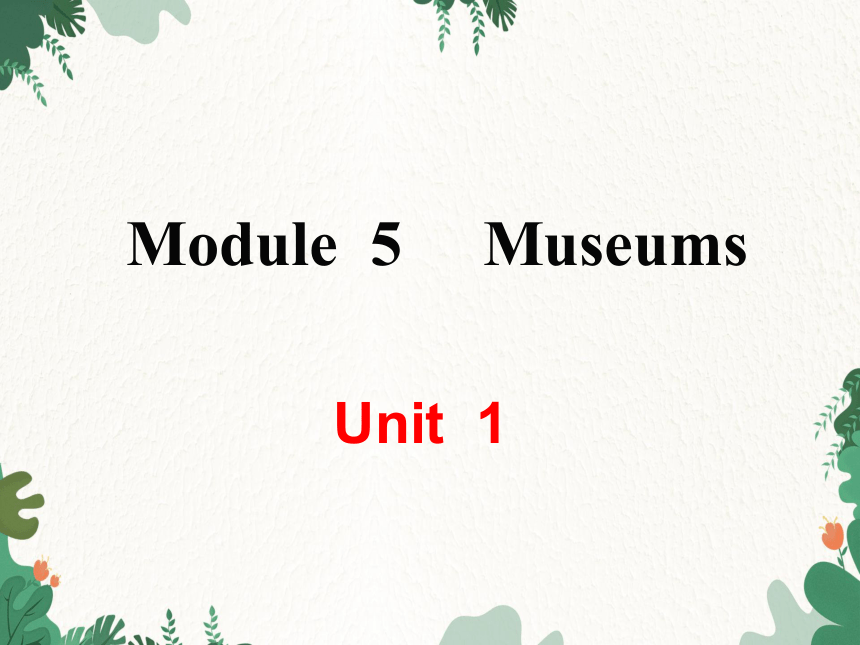
|
|
| 格式 | ppt | ||
| 文件大小 | 7.3MB | ||
| 资源类型 | 教案 | ||
| 版本资源 | 外研版 | ||
| 科目 | 英语 | ||
| 更新时间 | 2023-07-21 00:00:00 | ||
图片预览


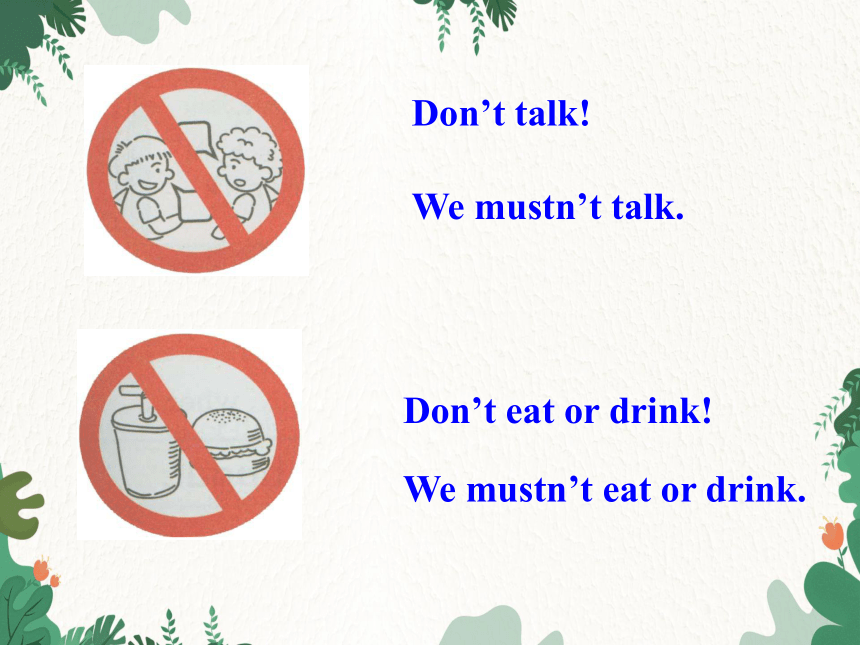
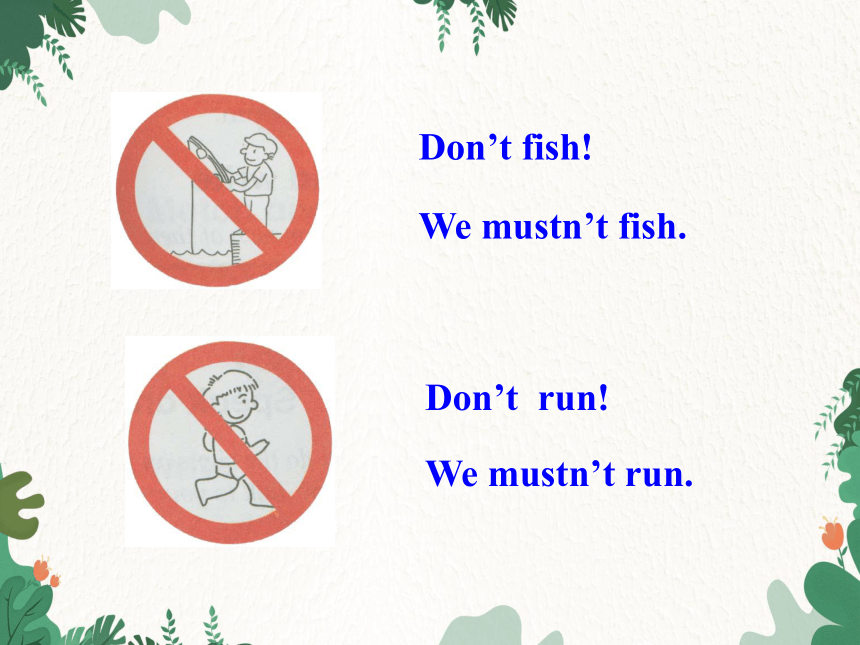
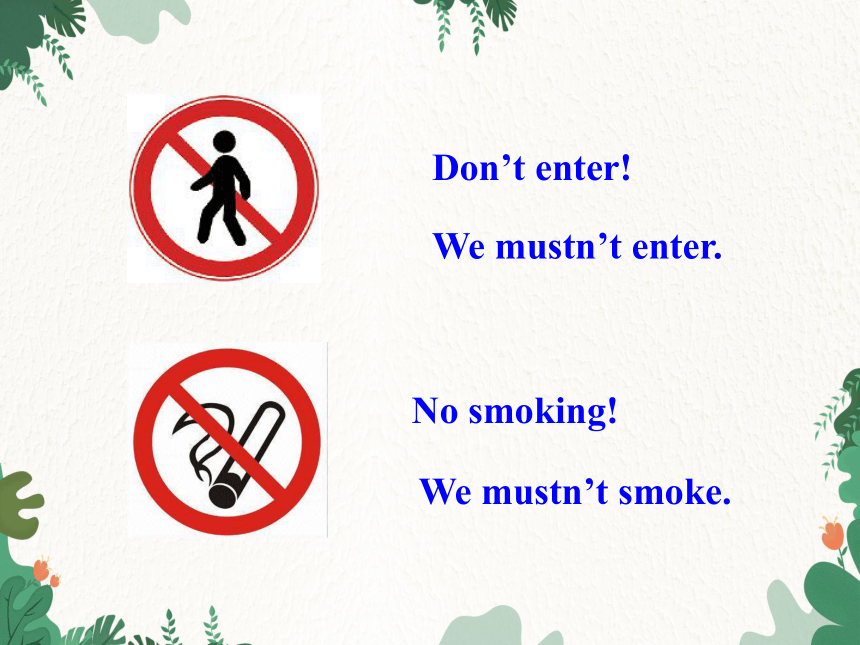
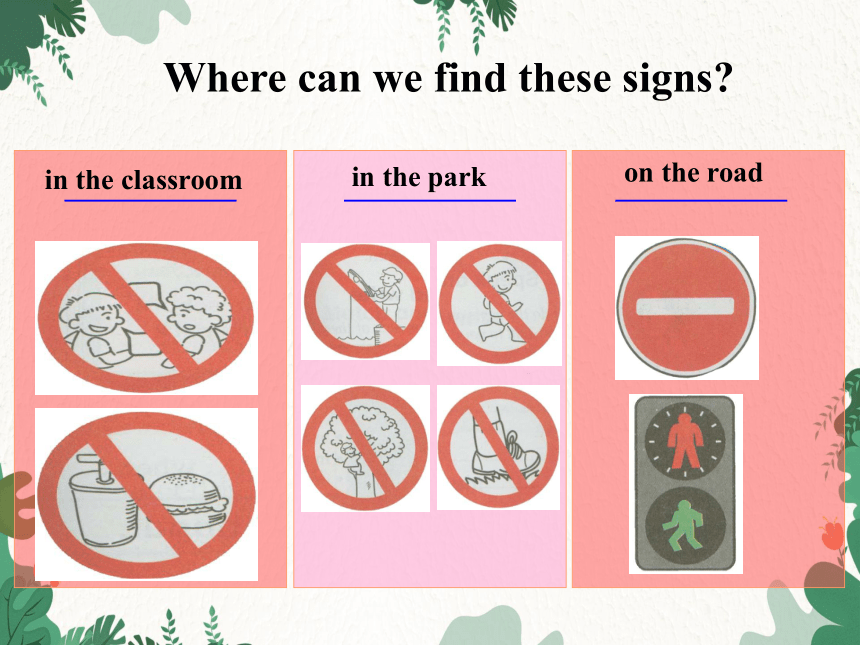
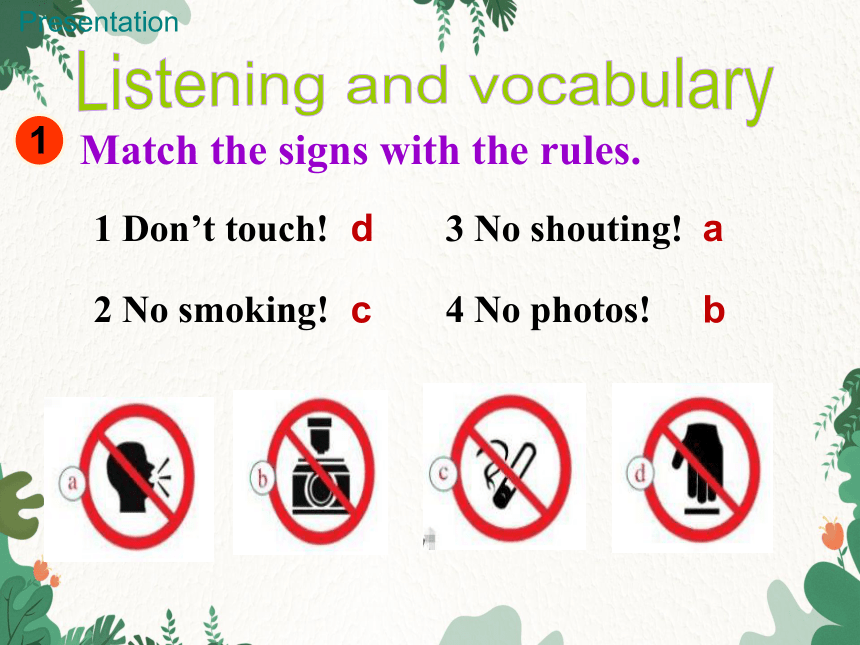
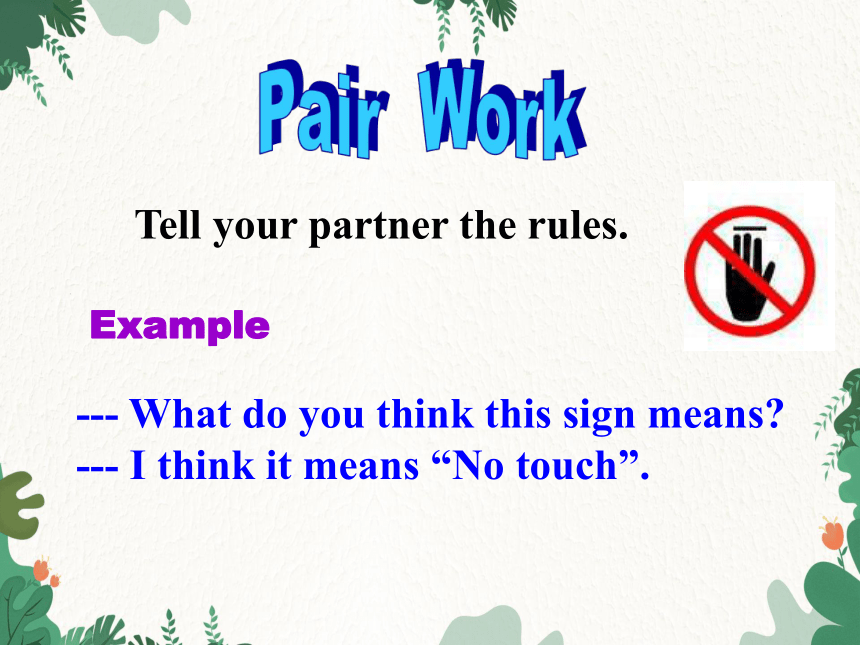
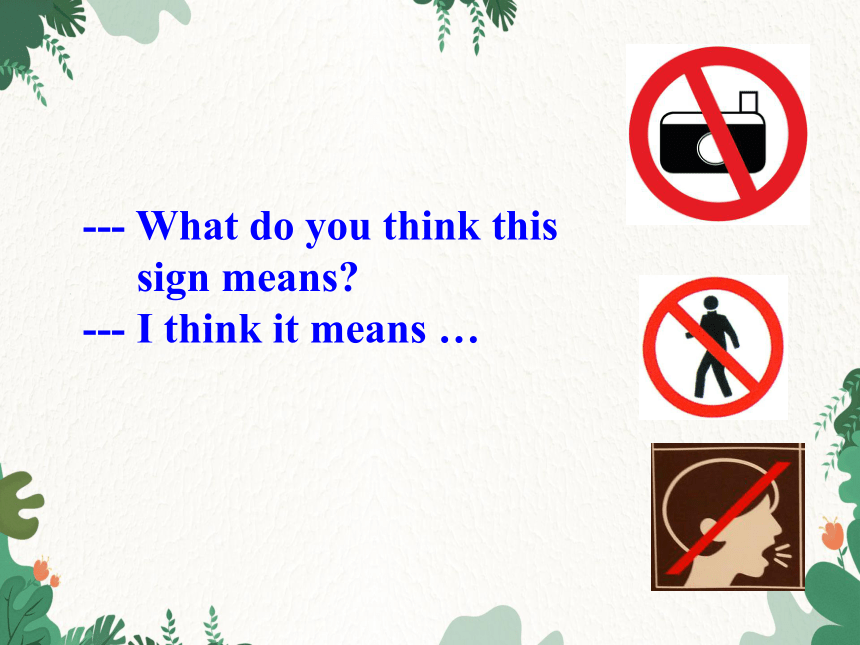
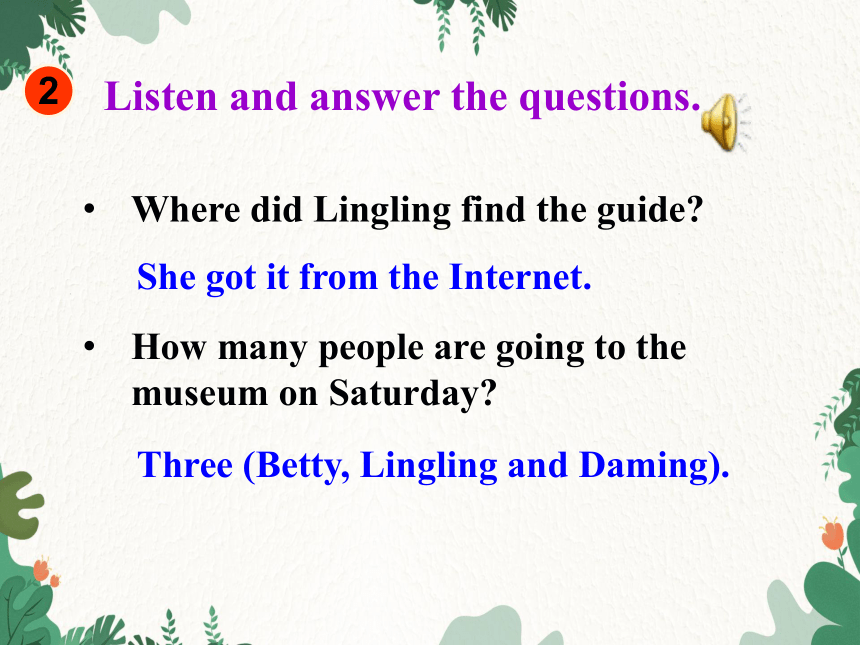
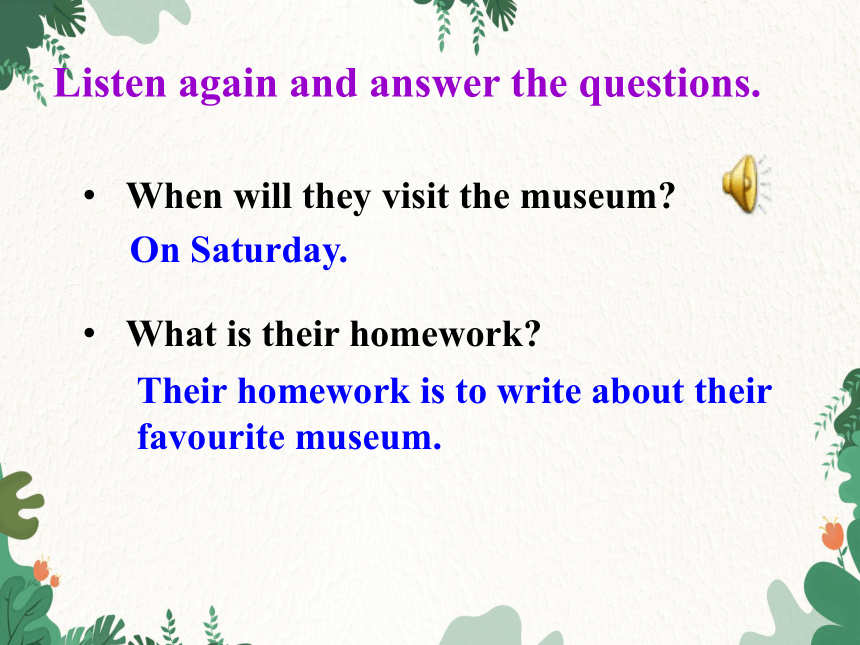
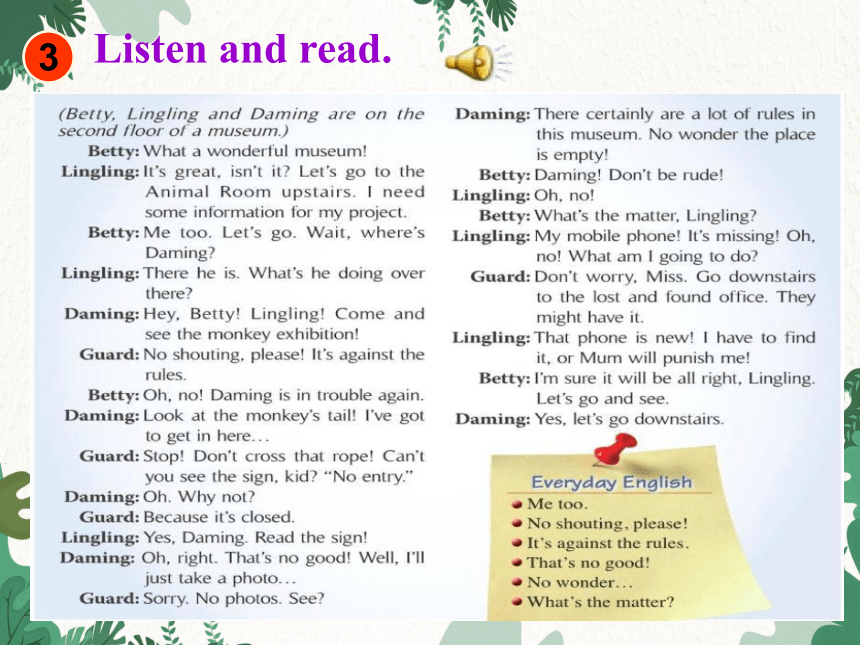
文档简介
(共66张PPT)
Unit 1
Module 5 Museums
What does each sign mean
Don’t climb trees!
Don’t walk on the grass!
We mustn’t walk on the grass.
We mustn’t climb trees.
Lead in
Don’t talk!
We mustn’t talk.
Don’t eat or drink!
We mustn’t eat or drink.
Don’t fish!
We mustn’t fish.
Don’t run!
We mustn’t run.
Don’t enter!
We mustn’t enter.
No smoking!
We mustn’t smoke.
Where can we find these signs
in the classroom
in the park
on the road
Presentation
1
Match the signs with the rules.
1 Don’t touch!
2 No smoking!
3 No shouting!
4 No photos!
d
c
a
b
Tell your partner the rules.
Example
--- What do you think this sign means
--- I think it means “No touch”.
--- What do you think this
sign means
--- I think it means …
Listen and answer the questions.
Where did Lingling find the guide
How many people are going to the museum on Saturday
She got it from the Internet.
Three (Betty, Lingling and Daming).
2
When will they visit the museum
What is their homework
On Saturday.
Their homework is to write about their favourite museum.
Listen again and answer the questions.
3
Listen and read.
What room do the children want to visit
Are there lots of people in the museum
Listen, read and answer the questions.
Animal Room.
No, there are not.
3. What do the three friends see
4. What does Lingling discover at the end
They see the monkey exhibition.
She discovers that her mobile phone is missing.
Look at the signs. Can you guess what each sign means
Read the conversation again. Check (√) the rules mentioned in it.
√
√
√
Lead in
Write down what you cannot do in the museum.
No shouting.
No photos.
No entry.
4
Find the expressions in the conversation and tell the meanings.
● Me too.
● No shouting, please!
● It’s against the rules.
● That’s no good!
● No wonder …
● What’s the matter
Read the expressions and think of some situations to use them.
● Me too.
● No shouting, please!
● It’s against the rules.
● That’s no good!
● No wonder …
● What’s the matter
--- I'd like to have a cup of tea.
--- Me too.
2. --- What does the sign “Be quiet, please” mean
--- It means “No shouting, please”.
3. You can’t do that! It’s against the rules.
4. --- Look! The sign says “No photos”.
---Oh, that’s no good!
5. --- Her father is very rich.
--- No wonder she wouldn’t accept help.
6. --- What’s the matter, Gina
--- I have a headache.
Try to retell the dialogue according to the key words in the box.
upstairs exhibition rules rope tail
missing downstairs punish
After Reading
Lingling and Betty needed some information for their projects, so they wanted to go ______
to the Animal Room, but Daming got into trouble at the monkey _________. Daming broke the _____ by shouting and trying to cross the ______ when he planned to see a monkey with a long ______.
upstairs
exhibition
rules
rope
Complete the passage with the words in the box.
downstairs exhibition missing punish rope rules tail upstairs
5
tail
Then they discovered that Lingling’s mobile phone was _______. The guard told them to go ___________ to the lost and found office. Lingling has to find her phone, or her mother will ______ her.
missing
downstairs
punish
downstairs exhibition missing punish rope rules tail upstairs
Complete the sentences with the correct form of the words and phrases.
1. You aren’t allowed to take photos.
It’s _______________.
2. The shop is _________ and the Technology room is _________.
against the rules
downstairs
upstairs
against the rules; downstairs; hurry up;
pay attention to; sign; upstairs
3. _________. We haven’t got much time
before it closes.
Hurry up
4. I didn’t know it wasn’t allowed. I
didn’t _______________ the _______.
pay attention to
sign
against the rules; downstairs; hurry up;
pay attention to; sign; upstairs
我们在朗读英语或用英语交谈时, 并不是句子中的每个词都读得一样响亮、一样清楚, 而是有些词读得或说得又轻又快, 而且较为含糊, 有些词则读得或说得又重又慢, 而且较为清晰。那些读得或说得响亮而清晰的词就是句子重音所在。
句子重音的功能:
1.体现句子的节奏感和韵律感。
2.突出重点, 使听者更容易理解。
Pronunciation
哪些词在句子中需重读?
1. 一般来说, 在句子中需重读的词都是实词, 如名词、动词、形容词、副词、数词、代词等。不重读的多为虚词, 如冠词、连词、介词、感叹词等。
The streets are wide and clean.
(这句话中的streets是名词, wide和clean是形容词, 它们都要重读; the, are, and不重读。)
I am so glad to see you again.
(这句话中的so, glad, see, again要重读,而I, am, to, you不重读。)
2.有时候虚词也要重读, 以下几点需注意:
1) 强调或突出某个虚词或be动词时, 应将其重读。
2) 介词在句首时往往要重读。
3) be动词及助动词和not结合时要重读。
4) 句子末尾的be动词和助动词一般要重读。
Listen and underline the words the speaker stresses.
No shouting, please! It’s against the rules.
Because it’s closed.
There certainly are a lot of rules in this museum.
Now listen again and repeat.
6
Work in pairs. Discuss the rules in the classroom.
—Must we keep quiet in the classroom
—Yes.No shouting in she classroom.
Practice
7
eat snacks
shout
put up your hand
throw rubbish
run after
keep clean
clean the blackboard
be late
hand in homework on time
Don’t eat
in class.
Don’t arrive
late for class
Don’t sleep
in class.
Don’t run in
the hallways.
Don’t talk .
Don’t fight.
Don’t listen
to music in
the classroom.
school rules
Choose (选择)a lucky number.
Don’t be late for class./Don’t arrive late for class.
What do you say to him
Guess.(猜一猜)
Don’t sleep in class.
What do you say to them
Don’t eat in classroom.
Act it out(表演).
Don’t play computer games.
What does it mean(意思)?
Don’t take photos.
Don’t fight!
What do you say to them
Don’t talk in class!
What do you say to him
Don’t run in the hallways.
Write a passage about a museum you have ever been to. Say something that you can and can’t do in the museum.
Writing
Language points
Let’s go to the Animal Room upstairs.
upstairs adv. 往楼上;在楼上
Jim lived upstairs.
吉姆住在楼上。
It was very hot. I went upstairs and changed into a thinner dress.
天气非常闷热, 我上楼换一件单薄的衣服。
upstairs adj. 位于楼上的;上层的
He is waiting in the upstairs hall.
他正在楼上的大厅里等候。
downstairs adj. 楼下的
adv. 在楼下;向楼下
知识链接
2. It’s against the rules.
against prep. 违反;违背;对抗
This explanation is against the natural law.
这种解释是违背自然规律的。
It is against the traffic law to drive after drinking.
酒后驾车违反交规。
Who are you playing against in the next match
下一场比赛你们和谁对抗?
Chinese team will play ______ Japanese
team.
A. with B. on C. for D. against
(浙江杭州) She had to sell the house even though it was ______ her own wishes.
A. above B. on C. against D. for
D
C
3. Daming is in trouble again.
in trouble 遇上麻烦;处于困境
Do as you're told, or you'll be in trouble.
叫你怎么做就怎么做,否则你会有麻烦。
Now he is in trouble, we should go to help him.
现在他正遇到了麻烦,我们应该去帮助他。
in与抽象名词构成的短语还有:
in debt 负债
in danger 处于危险
in power 当权
in peace 平静地
in need 需要
in return 作为回报
in silence 沉默
4. No entry.
entry n. 进入;进入权;进入许可
You mustn't drive into a street with a “No entry” sign.
你切勿把车驶进有“不得进入”标示的街道。
You can leave your umbrella in the entry.
雨伞可放在入口处。
enter v. 进入
Please do not enter before knocking on the door.
进来前请先敲门。
She refused to enter the discussion.
她拒绝参加讨论。
知识链接
5. No wonder the place is empty!
no wonder 难怪;不足为奇
No wonder she is ill! She eats next to nothing.
难怪她生病! 她几乎什么也不吃。
It is no wonder that the children love to visit the farm.
孩子们喜欢去农场玩是不足为怪的。
(安徽) --- I’m afraid I can’t get there before 9 o’clock. --- That’s OK. There’s ______. A. no way B. no wonder
C. no doubt D. no hurry
你的胃疼并不令人惊讶, 你吃得太多了。(after all)
D
No wonder that your stomach aches. You have eaten too much.
6. It’s missing.
missing adj. 找不到的;失踪的
I never found the missing book.
我一直没找到丢了的那本书。
Police are looking for the missing children.
警察正在寻找失踪的孩子。
I found a number of books missing.
我发现有几本书丢了。
missing表示“失掉; 不见”, 强调“应该有而缺少”
7. …, or Mum will punish me!
punish v. 惩罚;惩处
Their teacher punished them for their rudeness.
老师因为他们态度粗鲁而责罚他们。
We wonder whom the teacher is going to punish.
我们极想知道老师要处罚谁。
punishment n. 惩罚
punish … for … 为…惩罚…
He punished his son for lying.
他因儿子撒谎而处罚他。
punish … with / by 以…处罚…
They punished him with death.
他们判处他死刑。
The mother punished her child by not allowing him to go out.
母亲处罚自己的孩子, 不准他出去。
知识链接
根据首字母提示或所给汉语意思完成单词。
Exercises
She will have an e________ of her pictures.
2. The old man downstairs was very angry with the young man u_______.
3. My father didn’t go there because of an important meeting and my mother didn’t go, e_______.
xhibition
pstairs
ither
4. You should pay _________ (注意) to
the notice. It’s very important.
5. There are many ________ (警卫) standing beside the gate of this building.
6. The children were surprised by the sudden ________ (进入) of their teacher.
attention
guards
entry
7. Dangerous driving should be p______.
8. Do as you're told, or you'll be in t_______.
9. Dark clouds are a s______ of rain or snow.
10. It was a_________ that he knew nothing about the event.
unished
rouble
ign
mazing
Finish the exercises in the students’ book.
Homework
Thank you!
Unit 1
Module 5 Museums
What does each sign mean
Don’t climb trees!
Don’t walk on the grass!
We mustn’t walk on the grass.
We mustn’t climb trees.
Lead in
Don’t talk!
We mustn’t talk.
Don’t eat or drink!
We mustn’t eat or drink.
Don’t fish!
We mustn’t fish.
Don’t run!
We mustn’t run.
Don’t enter!
We mustn’t enter.
No smoking!
We mustn’t smoke.
Where can we find these signs
in the classroom
in the park
on the road
Presentation
1
Match the signs with the rules.
1 Don’t touch!
2 No smoking!
3 No shouting!
4 No photos!
d
c
a
b
Tell your partner the rules.
Example
--- What do you think this sign means
--- I think it means “No touch”.
--- What do you think this
sign means
--- I think it means …
Listen and answer the questions.
Where did Lingling find the guide
How many people are going to the museum on Saturday
She got it from the Internet.
Three (Betty, Lingling and Daming).
2
When will they visit the museum
What is their homework
On Saturday.
Their homework is to write about their favourite museum.
Listen again and answer the questions.
3
Listen and read.
What room do the children want to visit
Are there lots of people in the museum
Listen, read and answer the questions.
Animal Room.
No, there are not.
3. What do the three friends see
4. What does Lingling discover at the end
They see the monkey exhibition.
She discovers that her mobile phone is missing.
Look at the signs. Can you guess what each sign means
Read the conversation again. Check (√) the rules mentioned in it.
√
√
√
Lead in
Write down what you cannot do in the museum.
No shouting.
No photos.
No entry.
4
Find the expressions in the conversation and tell the meanings.
● Me too.
● No shouting, please!
● It’s against the rules.
● That’s no good!
● No wonder …
● What’s the matter
Read the expressions and think of some situations to use them.
● Me too.
● No shouting, please!
● It’s against the rules.
● That’s no good!
● No wonder …
● What’s the matter
--- I'd like to have a cup of tea.
--- Me too.
2. --- What does the sign “Be quiet, please” mean
--- It means “No shouting, please”.
3. You can’t do that! It’s against the rules.
4. --- Look! The sign says “No photos”.
---Oh, that’s no good!
5. --- Her father is very rich.
--- No wonder she wouldn’t accept help.
6. --- What’s the matter, Gina
--- I have a headache.
Try to retell the dialogue according to the key words in the box.
upstairs exhibition rules rope tail
missing downstairs punish
After Reading
Lingling and Betty needed some information for their projects, so they wanted to go ______
to the Animal Room, but Daming got into trouble at the monkey _________. Daming broke the _____ by shouting and trying to cross the ______ when he planned to see a monkey with a long ______.
upstairs
exhibition
rules
rope
Complete the passage with the words in the box.
downstairs exhibition missing punish rope rules tail upstairs
5
tail
Then they discovered that Lingling’s mobile phone was _______. The guard told them to go ___________ to the lost and found office. Lingling has to find her phone, or her mother will ______ her.
missing
downstairs
punish
downstairs exhibition missing punish rope rules tail upstairs
Complete the sentences with the correct form of the words and phrases.
1. You aren’t allowed to take photos.
It’s _______________.
2. The shop is _________ and the Technology room is _________.
against the rules
downstairs
upstairs
against the rules; downstairs; hurry up;
pay attention to; sign; upstairs
3. _________. We haven’t got much time
before it closes.
Hurry up
4. I didn’t know it wasn’t allowed. I
didn’t _______________ the _______.
pay attention to
sign
against the rules; downstairs; hurry up;
pay attention to; sign; upstairs
我们在朗读英语或用英语交谈时, 并不是句子中的每个词都读得一样响亮、一样清楚, 而是有些词读得或说得又轻又快, 而且较为含糊, 有些词则读得或说得又重又慢, 而且较为清晰。那些读得或说得响亮而清晰的词就是句子重音所在。
句子重音的功能:
1.体现句子的节奏感和韵律感。
2.突出重点, 使听者更容易理解。
Pronunciation
哪些词在句子中需重读?
1. 一般来说, 在句子中需重读的词都是实词, 如名词、动词、形容词、副词、数词、代词等。不重读的多为虚词, 如冠词、连词、介词、感叹词等。
The streets are wide and clean.
(这句话中的streets是名词, wide和clean是形容词, 它们都要重读; the, are, and不重读。)
I am so glad to see you again.
(这句话中的so, glad, see, again要重读,而I, am, to, you不重读。)
2.有时候虚词也要重读, 以下几点需注意:
1) 强调或突出某个虚词或be动词时, 应将其重读。
2) 介词在句首时往往要重读。
3) be动词及助动词和not结合时要重读。
4) 句子末尾的be动词和助动词一般要重读。
Listen and underline the words the speaker stresses.
No shouting, please! It’s against the rules.
Because it’s closed.
There certainly are a lot of rules in this museum.
Now listen again and repeat.
6
Work in pairs. Discuss the rules in the classroom.
—Must we keep quiet in the classroom
—Yes.No shouting in she classroom.
Practice
7
eat snacks
shout
put up your hand
throw rubbish
run after
keep clean
clean the blackboard
be late
hand in homework on time
Don’t eat
in class.
Don’t arrive
late for class
Don’t sleep
in class.
Don’t run in
the hallways.
Don’t talk .
Don’t fight.
Don’t listen
to music in
the classroom.
school rules
Choose (选择)a lucky number.
Don’t be late for class./Don’t arrive late for class.
What do you say to him
Guess.(猜一猜)
Don’t sleep in class.
What do you say to them
Don’t eat in classroom.
Act it out(表演).
Don’t play computer games.
What does it mean(意思)?
Don’t take photos.
Don’t fight!
What do you say to them
Don’t talk in class!
What do you say to him
Don’t run in the hallways.
Write a passage about a museum you have ever been to. Say something that you can and can’t do in the museum.
Writing
Language points
Let’s go to the Animal Room upstairs.
upstairs adv. 往楼上;在楼上
Jim lived upstairs.
吉姆住在楼上。
It was very hot. I went upstairs and changed into a thinner dress.
天气非常闷热, 我上楼换一件单薄的衣服。
upstairs adj. 位于楼上的;上层的
He is waiting in the upstairs hall.
他正在楼上的大厅里等候。
downstairs adj. 楼下的
adv. 在楼下;向楼下
知识链接
2. It’s against the rules.
against prep. 违反;违背;对抗
This explanation is against the natural law.
这种解释是违背自然规律的。
It is against the traffic law to drive after drinking.
酒后驾车违反交规。
Who are you playing against in the next match
下一场比赛你们和谁对抗?
Chinese team will play ______ Japanese
team.
A. with B. on C. for D. against
(浙江杭州) She had to sell the house even though it was ______ her own wishes.
A. above B. on C. against D. for
D
C
3. Daming is in trouble again.
in trouble 遇上麻烦;处于困境
Do as you're told, or you'll be in trouble.
叫你怎么做就怎么做,否则你会有麻烦。
Now he is in trouble, we should go to help him.
现在他正遇到了麻烦,我们应该去帮助他。
in与抽象名词构成的短语还有:
in debt 负债
in danger 处于危险
in power 当权
in peace 平静地
in need 需要
in return 作为回报
in silence 沉默
4. No entry.
entry n. 进入;进入权;进入许可
You mustn't drive into a street with a “No entry” sign.
你切勿把车驶进有“不得进入”标示的街道。
You can leave your umbrella in the entry.
雨伞可放在入口处。
enter v. 进入
Please do not enter before knocking on the door.
进来前请先敲门。
She refused to enter the discussion.
她拒绝参加讨论。
知识链接
5. No wonder the place is empty!
no wonder 难怪;不足为奇
No wonder she is ill! She eats next to nothing.
难怪她生病! 她几乎什么也不吃。
It is no wonder that the children love to visit the farm.
孩子们喜欢去农场玩是不足为怪的。
(安徽) --- I’m afraid I can’t get there before 9 o’clock. --- That’s OK. There’s ______. A. no way B. no wonder
C. no doubt D. no hurry
你的胃疼并不令人惊讶, 你吃得太多了。(after all)
D
No wonder that your stomach aches. You have eaten too much.
6. It’s missing.
missing adj. 找不到的;失踪的
I never found the missing book.
我一直没找到丢了的那本书。
Police are looking for the missing children.
警察正在寻找失踪的孩子。
I found a number of books missing.
我发现有几本书丢了。
missing表示“失掉; 不见”, 强调“应该有而缺少”
7. …, or Mum will punish me!
punish v. 惩罚;惩处
Their teacher punished them for their rudeness.
老师因为他们态度粗鲁而责罚他们。
We wonder whom the teacher is going to punish.
我们极想知道老师要处罚谁。
punishment n. 惩罚
punish … for … 为…惩罚…
He punished his son for lying.
他因儿子撒谎而处罚他。
punish … with / by 以…处罚…
They punished him with death.
他们判处他死刑。
The mother punished her child by not allowing him to go out.
母亲处罚自己的孩子, 不准他出去。
知识链接
根据首字母提示或所给汉语意思完成单词。
Exercises
She will have an e________ of her pictures.
2. The old man downstairs was very angry with the young man u_______.
3. My father didn’t go there because of an important meeting and my mother didn’t go, e_______.
xhibition
pstairs
ither
4. You should pay _________ (注意) to
the notice. It’s very important.
5. There are many ________ (警卫) standing beside the gate of this building.
6. The children were surprised by the sudden ________ (进入) of their teacher.
attention
guards
entry
7. Dangerous driving should be p______.
8. Do as you're told, or you'll be in t_______.
9. Dark clouds are a s______ of rain or snow.
10. It was a_________ that he knew nothing about the event.
unished
rouble
ign
mazing
Finish the exercises in the students’ book.
Homework
Thank you!
同课章节目录
- Module 1 Wonders of the world
- Unit 1 It's more than 2,000 years old.
- Unit 2 The Grand Canyon was not just big.
- Unit 3 Language in use
- Module 2 Public holidays
- Unit 1 My family always go somewhere interesting a
- Unit 2 We have celebrated the festival since the f
- Unit 3 Language in use
- Module 3 Heroes
- Unit 1 She trained hard,so she became a great play
- Unit 2There were few doctors, so he had to work ve
- Unit 3 Language in use
- Module 4 Home alone
- Unit 1 I can look after myself, although it won’t
- Unit 2 I became so bored with their orders that I
- Unit 3 Language in use
- Module 5 Museums
- Unit 1 Don't cross that rope!
- Unit 2 If you ever go to London, make sure you vis
- Unit 3 Language in use
- Module 6 Problems
- Unit 1 If I start after dinner, I'll finish it be
- Unit 2 If you tell him the truth now, you will sho
- Unit 3 Language in use
- Revision Module A
- Module 7 Great books
- Unit 1 We're still influenced by Confucius's idea
- Unit 2 It is still read and loved.
- Unit 3 Language in use
- Module 8 Sports life
- Unit 1 Daming wasn't chosen for the team last time
- Unit 2 He was invited to competitions around the w
- Unit 3 Language in use
- Module 9 Great inventions
- Unit 1 Will computers be used more than books in t
- Unit 2 Will books be replaced by the Internet?
- Unit 3 Language in use
- Module 10 Australia
- Unit 1 I have some photos that I took in Australia
- Unit 2 The game that they like most is Australian
- Unit 3 Language in use
- Module 11 Photos
- Unit 1 He's the boy who won the photo competition
- Unit 2 The photo which we liked best was taken by
- Unit 3 Language in use
- Module 12 Save our world
- Unit 1 If everyone starts to do something, the wor
- Unit 2 Repeat these three words daily: reduce, reu
- Unit 3 Language in use
- Revision Module B
